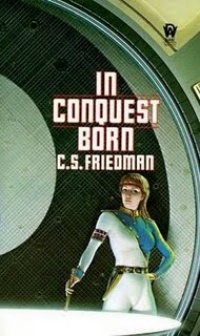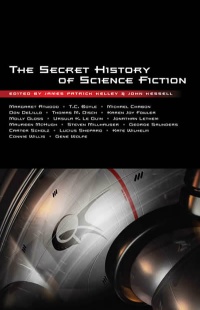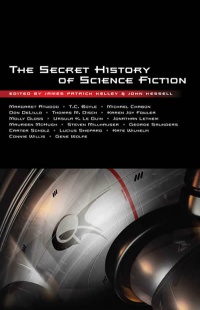Something bizarre, bigger than anyone could ever build, was protruding from the surface of Mercury. She was not sure whom to tell. She was not even sure she should tell anybody at all.
Title: Usurper of the Sun
Author: Housuke Nojiri
Year: 2002
Rating: 3 out of 5 stars
 VIZ Media’s Haikasoru imprint has, for a while now, been publishing English translations of Japanese science fiction in order to bring it to a wider audience. Since I have no familiarity with Japanese sf, I thought it was time to dive in and have a closer look. My first taste of the Haikasoru library is Usurper of the Sun, a first contact story in a hard sf vein with a compelling premise.
VIZ Media’s Haikasoru imprint has, for a while now, been publishing English translations of Japanese science fiction in order to bring it to a wider audience. Since I have no familiarity with Japanese sf, I thought it was time to dive in and have a closer look. My first taste of the Haikasoru library is Usurper of the Sun, a first contact story in a hard sf vein with a compelling premise.
Aki Shiraishi is a precocious member of her high school’s astronomy club. While observing a Mercurial eclipse with the school’s telescope, she discovers something unexpected: an apparent structure on the planet’s surface. A huge structure. What is it? How did it get there? Maybe more importantly, who put it there? As Aki’s observations are confirmed by the scientific community, these questions rage around the world as seven billion people debate the meaning of what may be the most important event in human history.
Soon, though, it becomes clear what the structure on Mercury is doing. The very material of the planet is being ejected, launched into space, and is slowly being assembled into a gigantic ring around the Sun. All the previous questions of who, what, and why are now transferred to the Ring, whose purpose is unknown. What is known is that the Ring has already begun blocking part of the Earth’s share of sunlight, and things will only get worse as the object grows.
This is a wake-up call for humanity to grow up fast, to stop all its petty bickering and fighting, and to join together to address the common threat. Over the course of several years, a spacecraft is built and a mission planned to investigate the Ring at close range. During this time, Aki has become a world-famous figure. Her discovery sparked in her an unquenchable passion to uncover the truth, and after an intense college education in the sciences she has become the world’s foremost “Ringologist.” So it’s no surprise when she is chosen for the mission.
Upon reaching the Ring, Aki succeeds in discovering it’s purpose — or at least a part of it — which leads to an even bigger revelation: our solar system is going to have visitors. This leads to a whole new set of questions. What will these aliens be like? Why are they coming here? Is it an invasion? Do they even know there’s life on Earth? How can we communicate with them?
The book’s cover blurb compares it to the work of Clarke, and I do get a vague sense of that, although I can’t put my finger on exactly why. I was reminded more of Lem, actually, in that one of the main themes of Usurper is the unlikelihood of any truly meaningful communication with an alien species.
This is a well-told and engaging story with a fascinating premise that takes a mature approach to the well-known first contact scenario. My only complaint might be that there’s a certain innocence to the whole thing, a kind of airy, Young Adult style to it. I don’t know if that was the author’s intention, or if maybe that’s a general Japanese aesthetic, or what. I just would have preferred a bit more sophistication in some of the story’s aspects, particularly in the characterization department. But minor complaints aside, it’s a good fun read, and I think you’ll enjoy it.

 I don’t often re-read books because there’s too much out there I haven’t read yet, and I don’t like to spend time retreading old ground. I pulled this old favorite out for a re-read for two reasons. First, I hadn’t read it since back in the 80’s. I recalled it as one of my very favorites, but my recollection was becoming hazy, so I wanted to see how it compares to my memory. (As it turns out, it’s not quite the masterpiece I remembered from my teen years, but it’s still a very strong novel.) Second, I only recently noticed that Friedman wrote a sequel which was published a few years ago (The Wilding, 2004), so before reading that I needed to get back up to speed.
I don’t often re-read books because there’s too much out there I haven’t read yet, and I don’t like to spend time retreading old ground. I pulled this old favorite out for a re-read for two reasons. First, I hadn’t read it since back in the 80’s. I recalled it as one of my very favorites, but my recollection was becoming hazy, so I wanted to see how it compares to my memory. (As it turns out, it’s not quite the masterpiece I remembered from my teen years, but it’s still a very strong novel.) Second, I only recently noticed that Friedman wrote a sequel which was published a few years ago (The Wilding, 2004), so before reading that I needed to get back up to speed. I wasn’t sure exactly what to expect from an anthology promising to reveal the “secret history” of science fiction. This volume finds its roots in the never-ending debate on the worthiness of sf as literature, and aims to present a variety of sf that is somehow more critically respectable. And so the editors have put together nineteen stories which are not your typical science fiction, stories which (at least most of them) intentionally try to blur the lines between sf and mainstream literature. Well hey, any well-read science fiction fan knows there is plenty of high-quality sf out there (as well as low-quality too, of course). But as to literary chic, I go with the Goldilocks standard: you shouldn’t have too little or too much, but juuuuuust the right amount. Unfortunately, the majority of these stories fall into the “too much” category, trying so hard to succeed at being “real” literature that they fail at being good sf. There are a few good stories here, but the majority are quite boring, artificial, or pretentious. I can’t say I’d be disappointed if most of them had remained a secret.
I wasn’t sure exactly what to expect from an anthology promising to reveal the “secret history” of science fiction. This volume finds its roots in the never-ending debate on the worthiness of sf as literature, and aims to present a variety of sf that is somehow more critically respectable. And so the editors have put together nineteen stories which are not your typical science fiction, stories which (at least most of them) intentionally try to blur the lines between sf and mainstream literature. Well hey, any well-read science fiction fan knows there is plenty of high-quality sf out there (as well as low-quality too, of course). But as to literary chic, I go with the Goldilocks standard: you shouldn’t have too little or too much, but juuuuuust the right amount. Unfortunately, the majority of these stories fall into the “too much” category, trying so hard to succeed at being “real” literature that they fail at being good sf. There are a few good stories here, but the majority are quite boring, artificial, or pretentious. I can’t say I’d be disappointed if most of them had remained a secret. At first glance, the latest novel from Banks is a conspiracy thriller set against the context of a familiar science fiction concept: the existence of a multiverse containing infinite versions of reality. Within this multiverse (of which our own Earth is but one infinitesimal piece) operates a shadowy group called the Concern, which seeks to manipulate specific events in the many worlds in order to influence the direction of their societies. The Concern’s agents (assassins, very often) are able to flit, or transition, between worlds by taking over local bodies, and few of them ever question the organization’s assertion that what they do is all for the greater good, a mission of philanthropy. But there are those who don’t buy the official line, leading the reader to the inevitable question: what’s the Concern really up to?
At first glance, the latest novel from Banks is a conspiracy thriller set against the context of a familiar science fiction concept: the existence of a multiverse containing infinite versions of reality. Within this multiverse (of which our own Earth is but one infinitesimal piece) operates a shadowy group called the Concern, which seeks to manipulate specific events in the many worlds in order to influence the direction of their societies. The Concern’s agents (assassins, very often) are able to flit, or transition, between worlds by taking over local bodies, and few of them ever question the organization’s assertion that what they do is all for the greater good, a mission of philanthropy. But there are those who don’t buy the official line, leading the reader to the inevitable question: what’s the Concern really up to?












